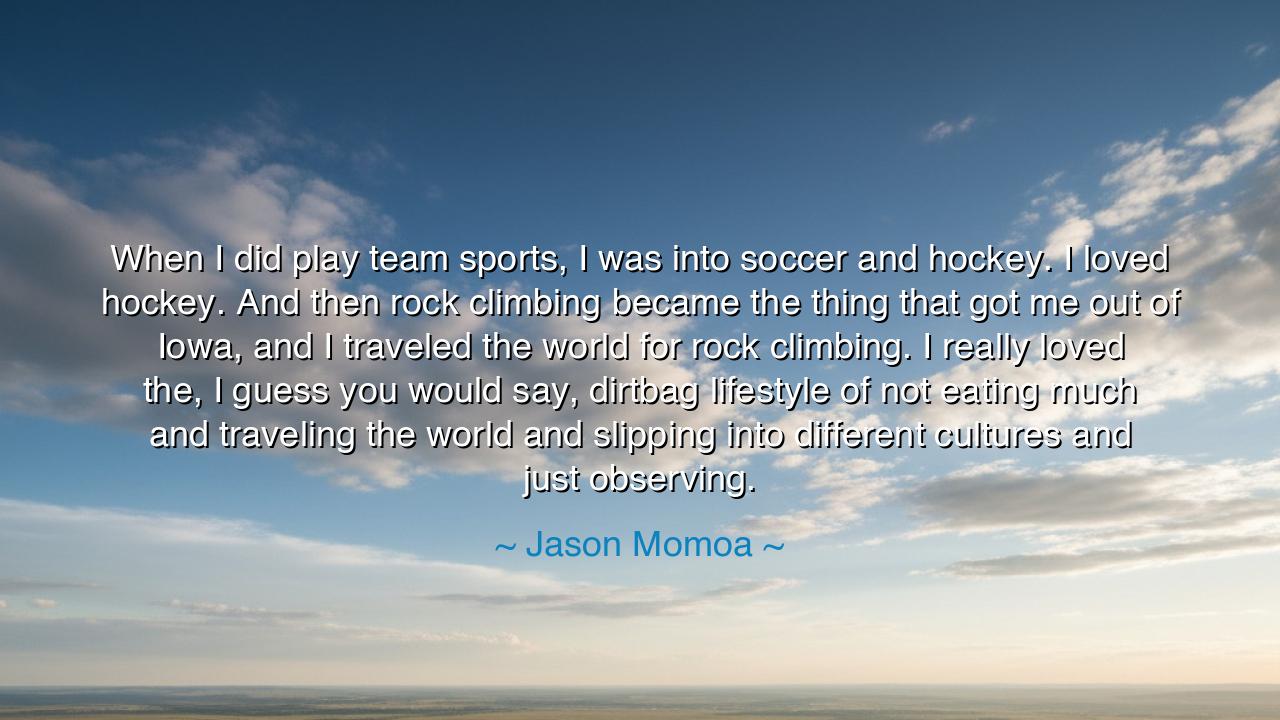
When I did play team sports, I was into soccer and hockey. I
When I did play team sports, I was into soccer and hockey. I loved hockey. And then rock climbing became the thing that got me out of Iowa, and I traveled the world for rock climbing. I really loved the, I guess you would say, dirtbag lifestyle of not eating much and traveling the world and slipping into different cultures and just observing.






When Jason Momoa reflected, “When I did play team sports, I was into soccer and hockey. I loved hockey. And then rock climbing became the thing that got me out of Iowa, and I traveled the world for rock climbing. I really loved the, I guess you would say, dirtbag lifestyle of not eating much and traveling the world and slipping into different cultures and just observing,” he was not simply telling of his youth, but offering a glimpse into the soul’s hunger for freedom, adventure, and self-discovery. His words reveal the shift from the structured order of team sports to the wild, ungoverned call of the mountains, where one learns not only strength of body but humility of spirit.
The ancients would have understood this transformation. In the city-states of Greece, boys trained in soccer-like ball games and in contests that built unity, much like Momoa’s love of hockey and teamwork. Yet beyond the walls of the polis, men also wandered into the mountains and wilderness, seeking solitude, challenge, and the wisdom of nature. Rock climbing, for Momoa, became such a path—a journey away from the roar of the crowd into the silence of stone and sky, where the only opponent is gravity and the only victory is survival.
His embrace of the so-called “dirtbag lifestyle” speaks to an ancient truth: that true freedom often demands sacrifice. To travel lightly, to live with little food, to surrender comfort for the sake of adventure—this is a kind of asceticism, a stripping away of excess so that one may encounter the rawness of life. Just as monks retreated into deserts or mountains to seek the divine, Momoa found meaning in the wandering life of the climber, learning from cultures, listening more than speaking, observing more than controlling.
Consider the story of Alexander von Humboldt, the great explorer and naturalist who journeyed through South America with little more than notebooks and instruments. He risked hardship and hunger, but his travels revealed truths about nature and culture that transformed the world’s understanding. Momoa’s travels, though not in pursuit of science, reflect the same spirit: to step into foreign lands with humility, to let the experience shape you rather than force your own shape upon it. This is the gift of travel and observation—it awakens the soul to the vastness of the world and the smallness of oneself.
Momoa’s love of hockey and soccer still lingers in his tale, for these team sports taught him camaraderie, trust, and shared struggle. Yet his journey shows us that not all spirits are meant to remain bound by the team or the arena. Some are called to the solitary path, where identity is forged in cliffs and caves, where life itself becomes the contest. To leave Iowa and embrace the wider world was not merely escape—it was metamorphosis, the awakening of a man who found his truest self not in stadiums, but in the wild.
The lesson here is deep: life offers us many stages of growth, and we must have the courage to follow the path that calls us most. For some, it is the field of team sports, where unity and loyalty are honed. For others, it is the solitary climb, the lean life, the openness to cultures and ways not our own. Both paths teach discipline, but in different ways. To know which one calls you is to know yourself—and to ignore that call is to live only half-awake.
Practically, this means embracing simplicity and seeking adventure not for luxury, but for transformation. It means being willing to leave comfort behind to grow, whether through travel, through nature, or through challenges that demand humility. And it means valuing observation—learning from others, from cultures, from the earth itself—rather than always seeking to impose your own voice.
Thus, Jason Momoa’s words endure as a teaching for wanderers and dreamers: embrace the team when it teaches you, but when the mountains call, do not fear the dirtbag life. For in simplicity, in hardship, and in stepping into worlds beyond your own, the soul finds a deeper strength than any arena can give. And in that strength, you will discover not only the world, but yourself.






AAdministratorAdministrator
Welcome, honored guests. Please leave a comment, we will respond soon